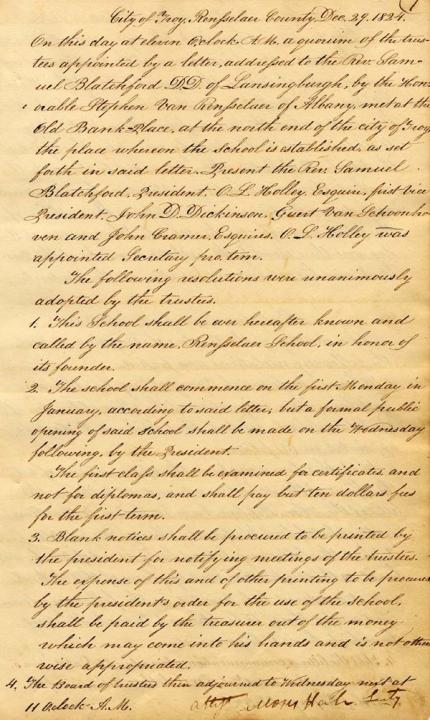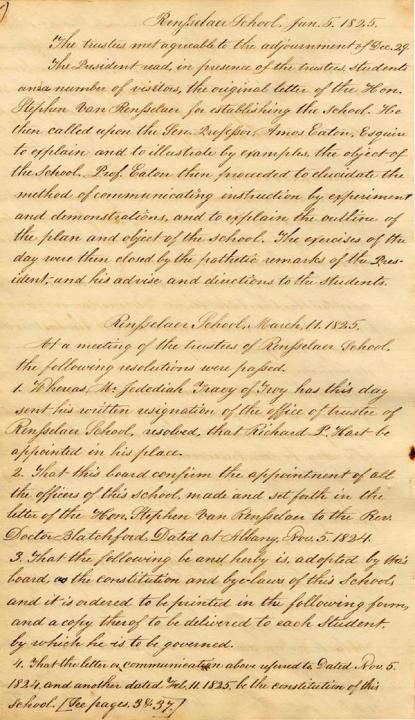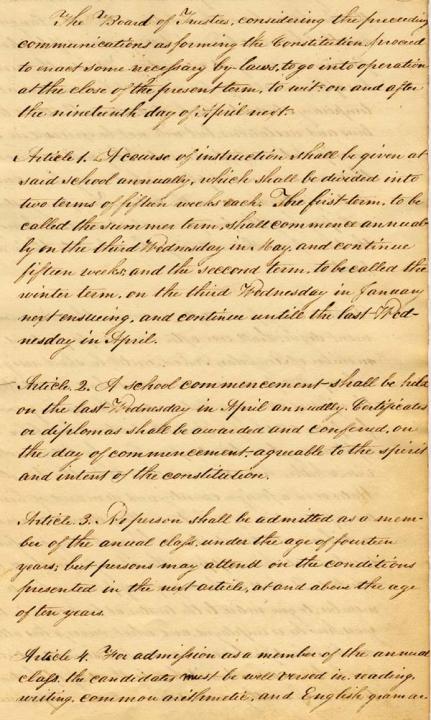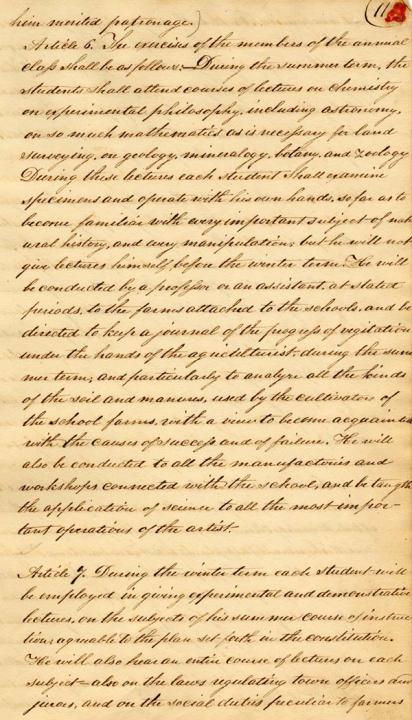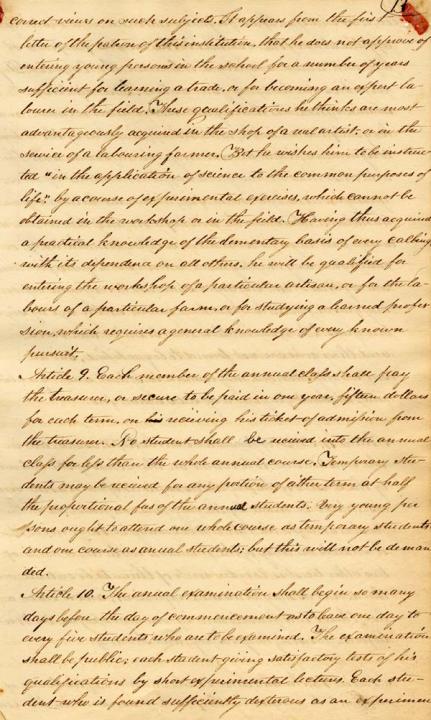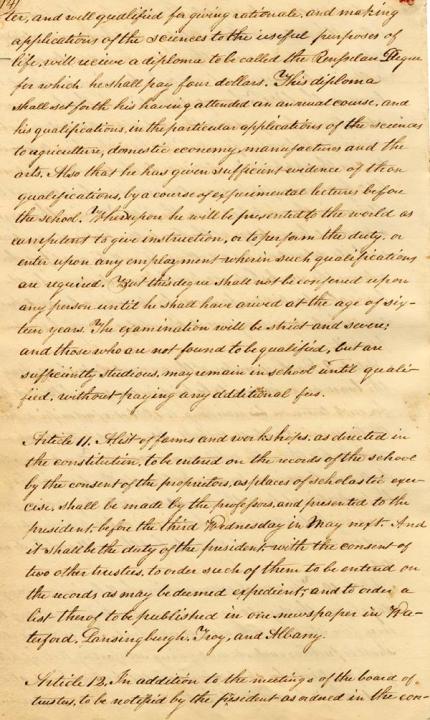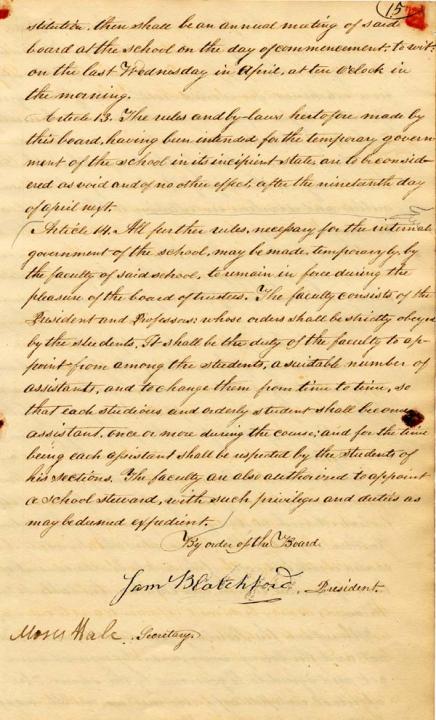City of Troy, Rensselaer County Dec. 27, 1824
On this day at eleven O’clock A.M. a quorum of the trustees appointed by a letter, addressed to the Rev. Samuel Blatchford D.D. of Lansingburgh, by the Honorable Stephen Van Rensselaer of Albany, met at the Old Bank Place, at the north end of the City of Troy, the place wherein the school is established, as set forth in said letter. Present the Rev. Samuel Blatchford, President O.L. Holley, Esquire, first Vice President John D. Dickinson, Guert Van Schoonhoven and John Cramer, Esquires O.L. Holley was appointed Secretary pro. tem.
The following resolutions were unanimously adapted by the trustees.
1. This School shall be ever hereafter known and called by the name Rensselaer School, in honor of its founder.
2. The school shall commence on the first Monday in January, according to said letter; but a formal public opening of said school shall be made on the Wednesday following, by the President.
The first class shall be examined for certificates and not for diplomas, and shall pay but ten dollars fees for the first term.
3. Blank notices shall be procured to be printed by the president for notifying meetings of the trustees. The expense of this and of other printing to be procured by the president’s order for the use of the school, shall be paid by the treasurer out of the money which may come into his hands and is not otherwise appropriated.
4. The Board of Trustees then adjourned to Wednesday next at 11 O’clock A.M.
Rensselaer School, Jan. 5, 1825
The trustees met agreeable to the adjournment of Dec. 29.
The President read in presence of the trustees, students and a number of visitors, the original letter of the Hon. Stephen Van Rensselaer for establishing the school. He then called upon the Sen. Professor Amos Eaton, Esquire to explain and to illustrate by examples the object of the School. Prof. Eaton then proceeded to elucidate the method of communicating instruction by experiment and demonstrations, and to explain the outline of the plan and object of the school. The exercises of the day were then closed by the pathetic remarks of the President, and his advise and directions to the students.
Rensselaer School, March 11, 1825
At a meeting of the trustees of Rensselaer School, the following resolutions were passed.
1. Whereas Mr. Jedediah Tracy of Troy has this day sent his written resignation of the Office of Trustee of Rensselaer School, resolved that Richard P. Hart be appointed in his place.
2. That this board confirm the appointment of all the offices of this school. Made and set forth in the letter of the Hon. Stephen Van Rensselaer to the Rev. Doctor Blatchford, Dated at Albany Nov. 5, 1824.
3. That the following be and hereby is adopted by this board, as the constitution and bye-laws of this school, and it is ordered to be printed in the following form and a copy there of to be delivered to each Student by which he is to be governed.
4. That the letter or communication above referred to Dated Nov. 5, 1824, and another dated Feb. 11, 1825, be the constitution of this school. [See pages 3 and 37]
The Board of Trustees considering the proceeding communications as forming the Constitution proceed to enact some necessary by-laws to go into operation at the close of the present term, to wit: on and after the nineteenth day if April next.
Article 1. A course of instruction shall be given at said school annually, which shall be divided into two terms of fifteen weeks each. The first term to be called the summer term, shall commence annually on the third Wednesday in May and continue fifteen weeks and the second term to be called the winter term on the third Wednesday in January next ensuing, and continue until the last Wednesday in April.
Article 2. A school commencement shall be held on the last Wednesday in April annually. Certificates or diplomas shall be awarded and conferred on the day of commencement agreeable to the spirit and intent of the Constitution.
Article 3. No person shall be admitted as a member of the annual class under the age of fourteen years; but persons may attend on the conditions presented in the next article, at and above the age of ten years.
Article 4. For admission as a member of the annual class the candidates must be well versed in reading, writing, common arithmetic and English grammar. It is very desirable though it will not be demanded that he shall have a knowledge of the Latin language: and that he would be much better prepared if he should first receive a collegiate education. Besides the members of the annual class, persons will be admitted as temporary students. Such students will attend lectures and recitations, but will not be exercised in the manipulations of experiments. They will not receive the commencement diplomas, but may have certificates of attendance on the lectures. Temporary students will pay half the fee of annual students, reckoning the time from their entering the school to their departure.
Article 5. Every person after receiving the commencement degree shall ever after remain perpetual member of Rensselaer School until he shall resign or be expelled for misconduct and shall be entitled to the right of attending lectures and the reading room free from all charges. And the trustees shall have a right at any time to call upon him by letter or otherwise, whether his residence shall be in the United States or in a foreign country and demand of him an explanation of whatever they deem immoral or dishonorable conduct. On his neglecting or refusing to exonerate himself from the charges, he shall be expelled. It shall be the duty of every person, while a member to give notice to the trustees at least once in three years, how he is employed, and what success has attended his scientific labours and what scientific discoveries he has made. And it shall be the duty of the trustees to aid every worthy industrious member in procuring him merited patronage.
Article 6. The exercises of the members of the annual class shall be as follows: During the summer term, the students shall attend courses of lectures on chemistry on experimental philosophy, including astronomy, on so much mathematics as is necessary for land surveying, on geology, mineralogy, botany, and zoology. During these lectures each student shall examine specimens and operate with his own hands, so far as to become familiar with every important subject of natural history, and every manipulations but he will not give lectures himself before the winter term. He will be conducted by a professor or an assistant at stated periods, to the farms attached to the schools, and be directed to keep a journal of the progress of vegetation under the hands of the agriculturist during the summer term; and particularly to analyze all the kinds of the soil and manures used by the cultivation of the school farms, with a view to become acquainted with the causes of success and of failure. He will also be conducted to all the manufactories and workshops connected with the school, and be taught the application of science to all the most important operations of the artist.
Article 7. During the winter term each student will be employed in giving experimental and demonstrative lectures, on the subjects of his summer course of instruction; agreeable to the plan set forth in the constitution. He will also hear an entire course of lectures on each subject – also on the laws regulating town officers and jurors, and on the social duties peculiar to farmers and mechanics. It will be the duty of the professors so to conduct the winter course, as to enable the diligent students to prepare himself for giving instructions on all the branches taught in the school, by lectures, experiments, and specimens, whether his services be required before a popular audience or academic students, in aid of other schools, which it is hoped may be formed on a similar plan for improvement.
Article 8. As the health of both body and mind requires considerable recreation, the following employments shall be the substitutes for those adopted at other schools. In the summer term the students shall be exercised by sections under the direction of the teachers in the art of inoculating and grafting trees, transplanting by roots, cutting and layers pruning trees, surveying farms, calculating heights and distances, measuring corded wood, scantling and boards, and calculating the velocity and pressure of rivers, water raceways, aqueducts and collecting and preserving plants and minerals and in such other laborious exercises as shall conform with the object of said school.
In the winter term the students shall be exercises by sections at the work shop in the school building, in the use of tools to qualify them for making repairs and performing small jobs when a professional artist is not at hand. By such exercises in the workshop it is not intended that students shall be qualified for exercising any of the mechanical arts; but for avoiding the delay and expense of calling a distant mechanic to accomplish a purpose which does not require a set of tools appertaining to any trade. Besides it is well known that by a little labour in the workshop, young persons acquire a taste for the mechanical arts, which will ever after inspire correct views on such subjects. It appears from the first letter of the patron of this institution that he does not approve of entering young persons in the school for a number of years sufficient for learning a trade, or for becoming an expert laborer in the field. These qualifications he thinks are most advantageously acquired in the shop of a real artist or in the service of a laboring farmer. But he wishes him to be instructed “in the application of service to the common purposes of life,” by a course of experimental exercises , which cannot be obtained in the workshop or in the field. Having thus acquired a practical knowledge of the elementary basis of every calling, with its dependence on all others, he will be qualified for entering the workshop of a particular artisan, or for the labours of a particular farmer, or for studying a learned profession, which requires a general knowledge of every known pursuit.
Article 9. Each member of the annual class shall pay the treasurer, or secure to be paid in one year, fifteen dollars for each term, on receiving his ticket for admission from the treasurer. No student shall be received into the annual class for less than the whole annual course. Temporary students may be received for any portion of either term at half the proportional fees of the annual students. Very young persons ought to attend one whole course as temporary students and one course as annual students; but this will not be demanded.
Article 10. The annual examination shall begin so many days before the day of commencement as to leave one day to every five students who are to be examined. The examination shall be public; each student giving satisfactory tests of his qualifications by short experimental lectures. Each student who is found sufficiently dexterous as an experimenter, and well qualified for giving rationale and making applications of the sciences to the useful purposes of life, will receive a diploma to be called the Rensselaer Degree for which he shall pay four dollars. This diploma shall set forth his having attended an annual course and his qualifications in the particular applications of the sciences to agriculture, domestic economy, manufactures and the arts. Also that he has given sufficient evidence of those qualifications by a course of experimental lectures before the school. Whereupon he will be presented to the world as competent to give instruction, or to perform the duty, or enter upon any employment wherein such qualifications are required. But this degree shall not be conferred upon any person until he shall have arrived at the age of sixteen years. The examination will be strict and severe and this who are not found to be qualified, but are sufficiently studious, may remain in school until qualified, without paying any additional fees.
Article 11. A list of farms and workshops as directed in the constitution to be entered on the records of the school by the consent of the proprietors as places of scholastic exercise, shall be made by the professors and presented to the president before the third Wednesday in May next. And it shall be the duty of the president with the consent of two other trustees to order such of them to be entered on the records as may be deemed expedient; and to order a list thereof to be published in one newspaper in Waterford, Lansingburgh, Troy, and Albany.
Article 12. In addition to the meetings of the board of trustees, to be notified by the president as ordered in the constitution, there shall be an annual meeting of said board at the school on the day of commencement to wit: on the last Wednesday in April at ten o’clock in the morning.
Article 13. The rules and by-laws heretofore made by the board, having been intended for the temporary government of the school in its incipient state, are to be considered as void and of no other effect, after the nineteenth day of April next.
Article 14. All further rules, necessary for the internal government of this school may be made temporarily by the faculty of said school, to remain in force during the pleasure of the board of trustees. The faculty consists of the President and Professors: whose orders shall be strictly obeyed by the students. It shall be the duty of the faculty to appoint from among the students, a suitable number of assistants, and to change them from time to time, so that each studious and orderly student shall become assistant once or more during the course; and for the time being each assistant shall be respected by the students of his sections. The faculty are also authorized to appoint a school steward, with such privileges and duties as may be deemed expedient.
By Order of the Board
Sam Blatchford, President
Moses Hale, Secretary
